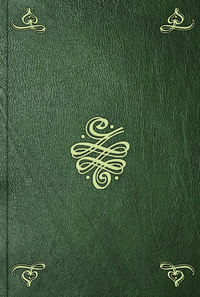 полная версия
полная версияCicero's Tusculan Disputations
XXXVI. Let us inquire, then, if obscurity, the want of power, or even the being unpopular, can prevent a wise man from being happy. Observe if popular favor, and this glory which they are so fond of, be not attended with more uneasiness than pleasure. Our friend Demosthenes was certainly very weak in declaring himself pleased with the whisper of a woman who was carrying water, as is the custom in Greece, and who whispered to another, “That is he—that is Demosthenes.” What could be weaker than 201this? and yet what an orator he was! But although he had learned to speak to others, he had conversed but little with himself. We may perceive, therefore, that popular glory is not desirable of itself; nor is obscurity to be dreaded. “I came to Athens,” saith Democritus, “and there was no one there that knew me:” this was a moderate and grave man who could glory in his obscurity. Shall musicians compose their tunes to their own tastes? and shall a philosopher, master of a much better art, seek to ascertain, not what is most true, but what will please the people? Can anything be more absurd than to despise the vulgar as mere unpolished mechanics, taken singly, and to think them of consequence when collected into a body? These wise men would contemn our ambitious pursuits and our vanities, and would reject all the honors which the people could voluntarily offer to them; but we know not how to despise them till we begin to repent of having accepted them. There is an anecdote related by Heraclitus, the natural philosopher, of Hermodorus, the chief of the Ephesians, that he said “that all the Ephesians ought to be punished with death for saying, when they had expelled Hermodorus out of their city, that they would have no one among them better than another; but that if there were any such, he might go elsewhere to some other people.” Is not this the case with the people everywhere? Do they not hate every virtue that distinguishes itself? What! was not Aristides (I had rather instance in the Greeks than ourselves) banished his country for being eminently just? What troubles, then, are they free from who have no connection whatever with the people? What is more agreeable than a learned retirement? I speak of that learning which makes us acquainted with the boundless extent of nature and the universe, and which even while we remain in this world discovers to us both heaven, earth, and sea.
XXXVII. If, then, honor and riches have no value, what is there else to be afraid of? Banishment, I suppose; which is looked on as the greatest evil. Now, if the evil of banishment proceeds not from ourselves, but from the froward disposition of the people, I have just now declared how contemptible it is. But if to leave one’s country be miserable, 202the provinces are full of miserable men, very few of the settlers in which ever return to their country again. But exiles are deprived of their property! What, then! has there not been enough said on bearing poverty? But with regard to banishment, if we examine the nature of things, not the ignominy of the name, how little does it differ from constant travelling! in which some of the most famous philosophers have spent their whole life, as Xenocrates, Crantor, Arcesilas, Lacydes, Aristotle, Theophrastus, Zeno, Cleanthes, Chrysippus, Antipater, Carneades, Panætius, Clitomachus, Philo, Antiochus, Posidonius, and innumerable others, who from their first setting-out never returned home again. Now, what ignominy can a wise man be affected with (for it is of such a one that I am speaking) who can be guilty of nothing which deserves it? for there is no occasion to comfort one who is banished for his deserts. Lastly, they can easily reconcile themselves to every accident who measure all their objects and pursuits in life by the standard of pleasure; so that in whatever place that is supplied, there they may live happily. Thus what Teucer said may be applied to every case:
“Wherever I am happy is my country.”Socrates, indeed, when he was asked where he belonged to, replied, “The world;” for he looked upon himself as a citizen and inhabitant of the whole world. How was it with T. Altibutius? Did he not follow his philosophical studies with the greatest satisfaction at Athens, although he was banished? which, however, would not have happened to him if he had obeyed the laws of Epicurus and lived peaceably in the republic. In what was Epicurus happier, living in his own country, than Metrodorus, who lived at Athens? Or did Plato’s happiness exceed that of Xenocrates, or Polemo, or Arcesilas? Or is that city to be valued much that banishes all her good and wise men? Demaratus, the father of our King Tarquin, not being able to bear the tyrant Cypselus, fled from Corinth to Tarquinii, settled there, and had children. Was it, then, an unwise act in him to prefer the liberty of banishment to slavery at home?
XXXVIII. Besides the emotions of the mind, all griefs 203and anxieties are assuaged by forgetting them, and turning our thoughts to pleasure. Therefore, it was not without reason that Epicurus presumed to say that a wise man abounds with good things, because he may always have his pleasures; from whence it follows, as he thinks, that that point is gained which is the subject of our present inquiry, that a wise man is always happy. What! though he should be deprived of the senses of seeing and hearing? Yes; for he holds those things very cheap. For, in the first place, what are the pleasures of which we are deprived by that dreadful thing, blindness? For though they allow other pleasures to be confined to the senses, yet the things which are perceived by the sight do not depend wholly on the pleasure the eyes receive; as is the case when we taste, smell, touch, or hear; for, in respect of all these senses, the organs themselves are the seat of pleasure; but it is not so with the eyes. For it is the mind which is entertained by what we see; but the mind may be entertained in many ways, even though we could not see at all. I am speaking of a learned and a wise man, with whom to think is to live. But thinking in the case of a wise man does not altogether require the use of his eyes in his investigations; for if night does not strip him of his happiness, why should blindness, which resembles night, have that effect? For the reply of Antipater the Cyrenaic to some women who bewailed his being blind, though it is a little too obscene, is not without its significance. “What do you mean?” saith he; “do you think the night can furnish no pleasure?” And we find by his magistracies and his actions that old Appius,70 too, who was blind for many years, was not prevented from doing whatever was required of him with respect either to the republic or his own affairs. It is said that C. Drusus’s house was crowded with clients. When they whose business it was could not see how to conduct themselves, they applied to a blind guide.
XXXIX. When I was a boy, Cn. Aufidius, a blind man, 204who had served the office of prætor, not only gave his opinion in the Senate, and was ready to assist his friends, but wrote a Greek history, and had a considerable acquaintance with literature. Diodorus the Stoic was blind, and lived many years at my house. He, indeed, which is scarcely credible, besides applying himself more than usual to philosophy, and playing on the flute, agreeably to the custom of the Pythagoreans, and having books read to him night and day, in all which he did not want eyes, contrived to teach geometry, which, one would think, could hardly be done without the assistance of eyes, telling his scholars how and where to draw every line. They relate of Asclepiades, a native of Eretria, and no obscure philosopher, when some one asked him what inconvenience he suffered from his blindness, that his reply was, “He was at the expense of another servant.” So that, as the most extreme poverty may be borne if you please, as is daily the case with some in Greece, so blindness may easily be borne, provided you have the support of good health in other respects. Democritus was so blind he could not distinguish white from black; but he knew the difference between good and evil, just and unjust, honorable and base, the useful and useless, great and small. Thus one may live happily without distinguishing colors; but without acquainting yourself with things, you cannot; and this man was of opinion that the intense application of the mind was taken off by the objects that presented themselves to the eye; and while others often could not see what was before their feet, he travelled through all infinity. It is reported also that Homer71 was blind, but we observe 205his painting as well as his poetry. What country, what coast, what part of Greece, what military attacks, what dispositions of battle, what array, what ship, what motions of men and animals, can be mentioned which he has not described in such a manner as to enable us to see what he could not see himself? What, then! can we imagine that Homer, or any other learned man, has ever been in want of pleasure and entertainment for his mind? Were it not so, would Anaxagoras, or this very Democritus, have left their estates and patrimonies, and given themselves up to the pursuit of acquiring this divine pleasure? It is thus that the poets who have represented Tiresias the Augur as a wise man and blind never exhibit him as bewailing his blindness. And Homer, too, after he had described Polyphemus as a monster and a wild man, represents him talking with his ram, and speaking of his good fortune, inasmuch as he could go wherever he pleased and touch what he would. And so far he was right, for that Cyclops was a being of not much more understanding than his ram.
XL. Now, as to the evil of being deaf. M. Crassus was a little thick of hearing; but it was more uneasiness to him that he heard himself ill spoken of, though, in my opinion, he did not deserve it. Our Epicureans cannot understand Greek, nor the Greeks Latin: now, they are deaf reciprocally as to each other’s language, and we are all truly deaf with regard to those innumerable languages which we do not understand. They do not hear the voice of the harper; but, then, they do not hear the grating of a saw when it is setting, or the grunting of a hog when his 206throat is being cut, nor the roaring of the sea when they are desirous of rest. And if they should chance to be fond of singing, they ought, in the first place, to consider that many wise men lived happily before music was discovered; besides, they may have more pleasure in reading verses than in hearing them sung. Then, as I before referred the blind to the pleasures of hearing, so I may the deaf to the pleasures of sight: moreover, whoever can converse with himself doth not need the conversation of another. But suppose all these misfortunes to meet in one person: suppose him blind and deaf—let him be afflicted with the sharpest pains of body, which, in the first place, generally of themselves make an end of him; still, should they continue so long, and the pain be so exquisite, that we should be unable to assign any reason for our being so afflicted—still, why, good Gods! should we be under any difficulty? For there is a retreat at hand: death is that retreat—a shelter where we shall forever be insensible. Theodorus said to Lysimachus, who threatened him with death, “It is a great matter, indeed, for you to have acquired the power of a Spanish fly!” When Perses entreated Paulus not to lead him in triumph, “That is a matter which you have in your own power,” said Paulus. I said many things about death in our first day’s disputation, when death was the subject; and not a little the next day, when I treated of pain; which things if you recollect, there can be no danger of your looking upon death as undesirable, or, at least, it will not be dreadful.
That custom which is common among the Grecians at their banquets should, in my opinion, be observed in life: Drink, say they, or leave the company; and rightly enough; for a guest should either enjoy the pleasure of drinking with others, or else not stay till he meets with affronts from those that are in liquor. Thus, those injuries of fortune which you cannot bear you should flee from.
XLI. This is the very same which is said by Epicurus and Hieronymus. Now, if those philosophers, whose opinion it is that virtue has no power of itself, and who say that the conduct which we denominate honorable and laudable is really nothing, and is only an empty circumstance 207set off with an unmeaning sound, can nevertheless maintain that a wise man is always happy, what, think you, may be done by the Socratic and Platonic philosophers? Some of these allow such superiority to the goods of the mind as quite to eclipse what concerns the body and all external circumstances. But others do not admit these to be goods; they make everything depend on the mind: whose disputes Carneades used, as a sort of honorary arbitrator, to determine. For, as what seemed goods to the Peripatetics were allowed to be advantages by the Stoics, and as the Peripatetics allowed no more to riches, good health; and other things of that sort than the Stoics, when these things were considered according to their reality, and not by mere names, his opinion was that there was no ground for disagreeing. Therefore, let the philosophers of other schools see how they can establish this point also. It is very agreeable to me that they make some professions worthy of being uttered by the mouth of a philosopher with regard to a wise man’s having always the means of living happily.
XLII. But as we are to depart in the morning, let us remember these five days’ discussions; though, indeed, I think I shall commit them to writing: for how can I better employ the leisure which I have, of whatever kind it is, and whatever it be owing to? And I will send these five books also to my friend Brutus, by whom I was not only incited to write on philosophy, but, I may say, provoked. And by so doing it is not easy to say what service I may be of to others. At all events, in my own various and acute afflictions, which surround me on all sides, I cannot find any better comfort for myself.
209THE NATURE OF THE GODS
BOOK I
I. There are many things in philosophy, my dear Brutus, which are not as yet fully explained to us, and particularly (as you very well know) that most obscure and difficult question concerning the Nature of the Gods, so extremely necessary both towards a knowledge of the human mind and the practice of true religion: concerning which the opinions of men are so various, and so different from each other, as to lead strongly to the inference that ignorance72 is the cause, or origin, of philosophy, and that the Academic philosophers have been prudent in refusing their assent to things uncertain: for what is more unbecoming to a wise man than to judge rashly? or what rashness is so unworthy of the gravity and stability of a philosopher as either to maintain false opinions, or, without the least hesitation, to support and defend what he has not thoroughly examined and does not clearly comprehend?
In the question now before us, the greater part of mankind have united to acknowledge that which is most probable, and which we are all by nature led to suppose, namely, that there are Gods. Protagoras73 doubted whether there were any. Diagoras the Melian and Theodorus of Cyrene entirely believed there were no such beings. But they who have affirmed that there are Gods, have expressed such a variety of sentiments on the subject, and the disagreement between them is so great, that it would be 210tiresome to enumerate their opinions; for they give us many statements respecting the forms of the Gods, and their places of abode, and the employment of their lives. And these are matters on which the philosophers differ with the most exceeding earnestness. But the most considerable part of the dispute is, whether they are wholly inactive, totally unemployed, and free from all care and administration of affairs; or, on the contrary, whether all things were made and constituted by them from the beginning; and whether they will continue to be actuated and governed by them to eternity. This is one of the greatest points in debate; and unless this is decided, mankind must necessarily remain in the greatest of errors, and ignorant of what is most important to be known.
II. For there are some philosophers, both ancient and modern, who have conceived that the Gods take not the least cognizance of human affairs. But if their doctrine be true, of what avail is piety, sanctity, or religion? for these are feelings and marks of devotion which are offered to the Gods by men with uprightness and holiness, on the ground that men are the objects of the attention of the Gods, and that many benefits are conferred by the immortal Gods on the human race. But if the Gods have neither the power nor the inclination to help us; if they take no care of us, and pay no regard to our actions; and if there is no single advantage which can possibly accrue to the life of man; then what reason can we have to pay any adoration, or any honors, or to prefer any prayers to them? Piety, like the other virtues, cannot have any connection with vain show or dissimulation; and without piety, neither sanctity nor religion can be supported; the total subversion of which must be attended with great confusion and disturbance in life.
I do not even know, if we cast off piety towards the Gods, but that faith, and all the associations of human life, and that most excellent of all virtues, justice, may perish with it.
There are other philosophers, and those, too, very great and illustrious men, who conceive the whole world to be directed and governed by the will and wisdom of the Gods; nor do they stop here, but conceive likewise that the Deities 211consult and provide for the preservation of mankind. For they think that the fruits, and the produce of the earth, and the seasons, and the variety of weather, and the change of climates, by which all the productions of the earth are brought to maturity, are designed by the immortal Gods for the use of man. They instance many other things, which shall be related in these books; and which would almost induce us to believe that the immortal Gods had made them all expressly and solely for the benefit and advantage of men. Against these opinions Carneades has advanced so much that what he has said should excite a desire in men who are not naturally slothful to search after truth; for there is no subject on which the learned as well as the unlearned differ so strenuously as in this; and since their opinions are so various, and so repugnant one to another, it is possible that none of them may be, and absolutely impossible that more than one should be, right.
III. Now, in a cause like this, I may be able to pacify well-meaning opposers, and to confute invidious censurers, so as to induce the latter to repent of their unreasonable contradiction, and the former to be glad to learn; for they who admonish one in a friendly spirit should be instructed, they who attack one like enemies should be repelled. But I observe that the several books which I have lately published74 have occasioned much noise and various discourse about them; some people wondering what the reason has been why I have applied myself so suddenly to the study of philosophy, and others desirous of knowing what my opinion is on such subjects. I likewise perceive that many people wonder at my following that philosophy75 chiefly which seems to take away the light, and to bury and envelop things in a kind of artificial night, and that I should so unexpectedly have taken up the defence of a school that has been long neglected and forsaken. But it is a mistake to suppose that this application to philosophical studies has been sudden on my part. I have applied 212myself to them from my youth, at no small expense of time and trouble; and I have been in the habit of philosophizing a great deal when I least seemed to think about it; for the truth of which I appeal to my orations, which are filled with quotations from philosophers, and to my intimacy with those very learned men who frequented my house and conversed daily with me, particularly Diodorus, Philo, Antiochus, and Posidonius,76 under whom I was bred; and if all the precepts of philosophy are to have reference to the conduct of life, I am inclined to think that I have advanced, both in public and private affairs, only such principles as may be supported by reason and authority.
IV. But if any one should ask what has induced me, in the decline of life, to write on these subjects, nothing is more easily answered; for when I found myself entirely disengaged from business, and the commonwealth reduced to the necessity of being governed by the direction and care of one man,77 I thought it becoming, for the sake of the public, to instruct my countrymen in philosophy, and that it would be of importance, and much to the honor and commendation of our city, to have such great and excellent subjects introduced in the Latin tongue. I the less repent of my undertaking, since I plainly see that I have excited in many a desire, not only of learning, but of writing; for we have had several Romans well grounded in the learning of the Greeks who were unable to communicate to their countrymen what they had learned, because they looked upon it as impossible to express that in Latin which they had received from the Greeks. In this point I think I have succeeded so well that what I have done is not, even in copiousness of expression, inferior to that language.
Another inducement to it was a melancholy disposition of mind, and the great and heavy oppression of fortune that was upon me; from which, if I could have found any surer remedy, I would not have sought relief in this pursuit. But I could procure ease by no means better than by not only applying myself to books, but by devoting myself 213to the examination of the whole body of philosophy. And every part and branch of this is readily discovered when every question is propounded in writing; for there is such an admirable continuation and series of things that each seems connected with the other, and all appear linked together and united.
V. Now, those men who desire to know my own private opinion on every particular subject have more curiosity than is necessary. For the force of reason in disputation is to be sought after rather than authority, since the authority of the teacher is often a disadvantage to those who are willing to learn; as they refuse to use their own judgment, and rely implicitly on him whom they make choice of for a preceptor. Nor could I ever approve this custom of the Pythagoreans, who, when they affirmed anything in disputation, and were asked why it was so, used to give this answer: “He himself has said it;” and this “he himself,” it seems, was Pythagoras. Such was the force of prejudice and opinion that his authority was to prevail even without argument or reason.
They who wonder at my being a follower of this sect in particular may find a satisfactory answer in my four books of Academical Questions. But I deny that I have undertaken the protection of what is neglected and forsaken; for the opinions of men do not die with them, though they may perhaps want the author’s explanation. This manner of philosophizing, of disputing all things and assuming nothing certainly, was begun by Socrates, revived by Arcesilaus, confirmed by Carneades, and has descended, with all its power, even to the present age; but I am informed that it is now almost exploded even in Greece. However, I do not impute that to any fault in the institution of the Academy, but to the negligence of mankind. If it is difficult to know all the doctrines of any one sect, how much more is it to know those of every sect! which, however, must necessarily be known to those who resolve, for the sake of discovering truth, to dispute for or against all philosophers without partiality.
I do not profess myself to be master of this difficult and noble faculty; but I do assert that I have endeavored to make myself so; and it is impossible that they who choose 214this manner of philosophizing should not meet at least with something worthy their pursuit. I have spoken more fully on this head in another place. But as some are too slow of apprehension, and some too careless, men stand in perpetual need of caution. For we are not people who believe that there is nothing whatever which is true; but we say that some falsehoods are so blended with all truths, and have so great a resemblance to them, that there is no certain rule for judging of or assenting to propositions; from which this maxim also follows, that many things are probable, which, though they are not evident to the senses, have still so persuasive and beautiful an aspect that a wise man chooses to direct his conduct by them.









